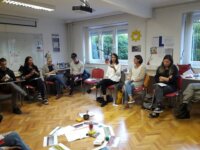Slovenians can now pay for future services through a dedicated website, enabling them to support local businesses and entrepreneurs who can no longer operate.
The offer is divided into several categories, customers can choose from products and services food and drink, tourism, beauty and health, retail stores and other craftsmen. For now, more than 270 bidders can buy securities.
Providers introduced themselves briefly on the website, their entire offer and references, and a voucher can be…
Country: Slovenia
Slovenia have established an official singel hot stop for Covid-19 with all current documents and information from both their national government and the EU.
It collects information published by the Slovenian government as well as by the European Commission in one place for citizens to access the most reliable informtation possible.
Office of Legislation has introduced a single national legal information system offering to the public the information on adopted laws, regulations and other legal acts free of charge, including EU and national case law, consolidated texts, and other information with significant impact on the application of national law. In addition to efficient and quick search through all sources of law, users can easily monitor the process of planning and adopting laws and regulations.
The Exchange was developed to raise awareness in tourism industry on the importance of serving local food and drinks even in urban destinations (Ljubljana). The project objective is to positively affect the living standard of local farmers whereby quality and quantity of local food in hotels and restaurants will increase. With this project, Ljubljana has successfully and uniquely linked tourism sector and local agriculture to bolster sustainable economic growth and create new opportunities.
Case Study
Crowdsourcing alternative policy proposals’ impacts on SMEs (small and medium enterprises)
Open and inclusive policy-making builds upon the idea of designing policies by broadening the evidence base. An innovative web-based tool called SME test enables the public (citizens, business entities, economic and other interest groups) to quantify the impact of their alternative policy proposals on SMEs, in addition to substantiating their comments and proposals on a public policy proposal. Despite the tool's ease of use, it enables users to conduct more sophisticated analysis.
The Government of Slovenia has developed a new approach to preparing government services and public policies. Through specially designed workshops with a 360° approach to different stakeholders, these so-called ˝Policy Jams˝ aim to develop citizen-centred policy solutions. Based on systems theories and service design principles they open up the discussion space, while gearing participants toward finding viable innovative solutions.
Case Study
Partnering with EMC Dell to Infuse Big Data Analysis into the Ministry of Public Administration of…
The pilot project “Big Data Analysis for HR efficiency improvement” has been established as part of the strategy supporting data-driven public administration in Slovenia. It ran within the Ministry of Public Administration in collaboration with the company EMC Dell to learn how big data tool could improve the efficiency of HR data.
Instead of composting or incinerating invasive alien plant species, we are developing new ways how to process them into new, useful products (paper and wood products, dyes and hybrid coatings, extracts for controlling of plant harmful organisms, food source, input materials for the industries of the future and 3D composites). Invasive alien species are a locally accessible and abundant resource and opportunity for a new business model, promoting zero‑waste approach and circular economy.
The challenge the city Ljubljana wanted to address was how to approach young people who have ideas. What works well, and what could be even better? City Incubator is a programme for the implementation of the ideas of young people in Ljubljana. It is a sustainable tool for implementation and co-financing of local youth initiatives. Individuals or groups may put ideas forward and in the frame of the programme, they receive professional support for the fine-tuning, and financial support for the…
In order to support the operation of certified cash registers, the Financial Administration (FA) launched a crowd-sourcing campaign in 2016 for the purpose of motivating consumers to receive an invoice, take it, check whether it is correct and send it to the FA. This way, every citizen was able to contribute crack down on invoice fraud and to reduce the shadow economy (which is the part of an economy involving goods and services which are paid for in cash, and therefore not declared for tax.)



